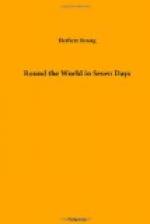Meanwhile Rodier, on Smith’s departure, had, as usual, set to work to clean the engine. He was tired and sleepy, and he would have been more than human if he had not thought that his employer had rather the best of the arrangement. But any private soreness he might have felt did not affect the speed or the thoroughness of his work. He first of all examined the wires: there was nothing wrong with them. Then he unscrewed the plugs and laid them on top of the engine, pulled the engine over, and finding that there was a poor spark, concluded that it was rather sooty. After cleaning the parts thoroughly with petrol, he again started the engine. The sparking being still weak, he examined the magneto: it was choked with grease. The next thing was to clean the brush with petrol and try the plugs again. The spark was now strong, and after giving everything a final polish, he replaced the plugs, satisfied that the engine was in good working order.
Switching off the searchlight for economy’s sake, and leaving only the small light that illuminated the compass, he sat down, opened a tin of sardines, and began to eat them with biscuits. A fastidious person might have objected to the mingling of flavours, olive oil and petrol not combining at all well; but Rodier was too old a hand to be dainty. He was in the act of munching a mouthful when his head dropped forward on his breast, and he fell into a sound sleep.
He was wakened by a voice in his ear. Jumping up with a start, he beheld a crowd of people watching him, men in Sunday coats, men in shirt sleeves, ladies in light dresses, boys in knickerbockers and Norfolks, girls in pinafores, Chinamen in coats of many colours, many of the throng holding torches and lanterns.
“Ah! mille diables!” he cried. “Keep back! This is not a penny theatre.”
“Nor yet a cook-shop,” said one of the visitors, with a laugh; “though you might think so.”
And then Rodier saw that the men and boys foremost in the group carried plates, dishes, bowls, bottles, jugs. One had a dish of chicken patties, another a plate of bananas, a third a bowl of Devonshire junket, a fourth a loaf of bread; others had cheese, apples, bottled beer, Australian wine, doughnuts, pork sausages, sponge cake, ham sandwiches; in short, all the constituents of a high tea except tea itself.
“Thought you might be hungry after your ride,” said one. “Have a sandwich?”
“Have a banana?” said another. “You won’t get ’em like this in London.”
“Dry work, ain’t it?” said a third, pulling a cork. “That’ll buck you up.”
“Please take one of my doughnuts,” piped a small boy, creeping around the right leg of a sturdy planter.
“Ma foi! This take the cake,” cried Rodier, laughing heartily. “Thank you, thank you, thank you! But truly I shall be very—very discomfortable if I eat all this riches. Ah; this is good, this is hospitality. My friends, I thank you, I love you; vive l’Australie!”




